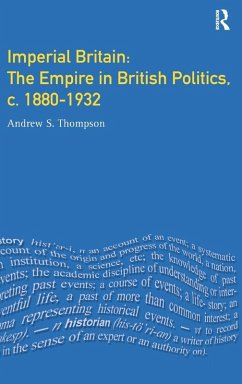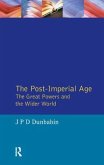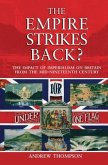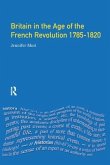- Gebundenes Buch
- Merkliste
- Auf die Merkliste
- Bewerten Bewerten
- Teilen
- Produkt teilen
- Produkterinnerung
- Produkterinnerung
This major new study considers the impact of the empire upon modern British political culture. The economic and cultural legacy of empire have received a great deal of attention, but historians have neglected the effects of empire upon the domestic British political scene. Dr Thompson explores economic, demographic, intellectual and military influences and he shows how parliamentary and party opinion interacted with imperial ideas and interests in the country at large.
Andere Kunden interessierten sich auch für
![Imperial Meridian Imperial Meridian]() C A BaylyImperial Meridian181,99 €
C A BaylyImperial Meridian181,99 €![Imperial Germany 1890 - 1918 Imperial Germany 1890 - 1918]() Ian PorterImperial Germany 1890 - 1918181,99 €
Ian PorterImperial Germany 1890 - 1918181,99 €![The Post-Imperial Age: The Great Powers and the Wider World The Post-Imperial Age: The Great Powers and the Wider World]() J P D DunbabinThe Post-Imperial Age: The Great Powers and the Wider World180,99 €
J P D DunbabinThe Post-Imperial Age: The Great Powers and the Wider World180,99 €![Refugees and Cultural Transfer to Britain Refugees and Cultural Transfer to Britain]() Refugees and Cultural Transfer to Britain180,99 €
Refugees and Cultural Transfer to Britain180,99 €![The Empire Strikes Back? The Empire Strikes Back?]() Andrew S ThompsonThe Empire Strikes Back?187,99 €
Andrew S ThompsonThe Empire Strikes Back?187,99 €![Tudor and Stuart Britain Tudor and Stuart Britain]() Roger LockyerTudor and Stuart Britain180,99 €
Roger LockyerTudor and Stuart Britain180,99 €![Britain in the Age of the French Revolution Britain in the Age of the French Revolution]() Jennifer MoriBritain in the Age of the French Revolution180,99 €
Jennifer MoriBritain in the Age of the French Revolution180,99 €-
-
-
This major new study considers the impact of the empire upon modern British political culture. The economic and cultural legacy of empire have received a great deal of attention, but historians have neglected the effects of empire upon the domestic British political scene. Dr Thompson explores economic, demographic, intellectual and military influences and he shows how parliamentary and party opinion interacted with imperial ideas and interests in the country at large.
Hinweis: Dieser Artikel kann nur an eine deutsche Lieferadresse ausgeliefert werden.
Hinweis: Dieser Artikel kann nur an eine deutsche Lieferadresse ausgeliefert werden.
Produktdetails
- Produktdetails
- Verlag: Taylor & Francis
- Seitenzahl: 240
- Erscheinungstermin: 5. Dezember 2016
- Englisch
- Abmessung: 234mm x 156mm x 14mm
- Gewicht: 513g
- ISBN-13: 9781138178373
- ISBN-10: 1138178373
- Artikelnr.: 71553567
- Herstellerkennzeichnung
- Libri GmbH
- Europaallee 1
- 36244 Bad Hersfeld
- gpsr@libri.de
- Verlag: Taylor & Francis
- Seitenzahl: 240
- Erscheinungstermin: 5. Dezember 2016
- Englisch
- Abmessung: 234mm x 156mm x 14mm
- Gewicht: 513g
- ISBN-13: 9781138178373
- ISBN-10: 1138178373
- Artikelnr.: 71553567
- Herstellerkennzeichnung
- Libri GmbH
- Europaallee 1
- 36244 Bad Hersfeld
- gpsr@libri.de
Andrew S. Thompson
Contents List of Figures, List of Tables Preface Acknowledgements
Abbreviations Map Introduction 1 Imperial Languages, Identities and Beliefs
Languages of imperialism Imagining empire: the idea of a British world
Imperial reform Dominion nationalism and imperial integration Margins of
empire: India and America Conclusion 2 Mobilising Imperialists The
mainsprings of imperial politics Extra-parliamentary agitation and empire
The Tariff Reform League The Navy League The Emigration Committee of the
Royal Colonial Institute The political status of imperial campaigns
Imperialism as a broad church Conclusion 3 Propagating Imperialism The
imperialising of the British press The new journalism and the old The press
and imperial agitation The Imperial Press Conference (1909) Conclusion 4
Imperial Trade: TariffReform 81 Joseph Chamberlain and the origins of
tariff reform 81 The background to the campaign 83 Imperial preference and
the economic unity of empire 85 The colonial perspective 90 India and
imperial preference 97 Critics of preference: past and present 104 5
Imperial Security: Naval Supremacy and Defence Planning 110 Defending the
Empire: the debate 110 The doctrine of sea power and the defence of empire
111 The size, distribution and composition of the Fleet 112 Colonial
participation in imperial defence 119 Defence planning and the Committee of
Imperial Defence 127 Conclusion 130 6 Populating the Empire: Overseas
Migration 133 British overseas migration in the long nineteenth century 133
The benefits of empire migration 135 Voluntary effort versus state
involvement 139 Migrant personality 141 Testing the suitability of migrants
152 Conclusion 154 7 The First World War and its Imperial Aftermath 157 The
Empire at war 157 The Empire in the aftermath of the War 161 Imperialists
in the Lloyd George Coalition 169 The Imperial War Cabinet and imperial
foreign policy 171 The Washington naval treaty (1921-22) and the Singapore
strategy 175 Tariff reform redivivus, the Empire Marketing Board, and the
Empire Settlement Act 178 Conclusion 183 Conclusions 186 Biographical
Appendix 196 Select Bibliography 202 Index
Abbreviations Map Introduction 1 Imperial Languages, Identities and Beliefs
Languages of imperialism Imagining empire: the idea of a British world
Imperial reform Dominion nationalism and imperial integration Margins of
empire: India and America Conclusion 2 Mobilising Imperialists The
mainsprings of imperial politics Extra-parliamentary agitation and empire
The Tariff Reform League The Navy League The Emigration Committee of the
Royal Colonial Institute The political status of imperial campaigns
Imperialism as a broad church Conclusion 3 Propagating Imperialism The
imperialising of the British press The new journalism and the old The press
and imperial agitation The Imperial Press Conference (1909) Conclusion 4
Imperial Trade: TariffReform 81 Joseph Chamberlain and the origins of
tariff reform 81 The background to the campaign 83 Imperial preference and
the economic unity of empire 85 The colonial perspective 90 India and
imperial preference 97 Critics of preference: past and present 104 5
Imperial Security: Naval Supremacy and Defence Planning 110 Defending the
Empire: the debate 110 The doctrine of sea power and the defence of empire
111 The size, distribution and composition of the Fleet 112 Colonial
participation in imperial defence 119 Defence planning and the Committee of
Imperial Defence 127 Conclusion 130 6 Populating the Empire: Overseas
Migration 133 British overseas migration in the long nineteenth century 133
The benefits of empire migration 135 Voluntary effort versus state
involvement 139 Migrant personality 141 Testing the suitability of migrants
152 Conclusion 154 7 The First World War and its Imperial Aftermath 157 The
Empire at war 157 The Empire in the aftermath of the War 161 Imperialists
in the Lloyd George Coalition 169 The Imperial War Cabinet and imperial
foreign policy 171 The Washington naval treaty (1921-22) and the Singapore
strategy 175 Tariff reform redivivus, the Empire Marketing Board, and the
Empire Settlement Act 178 Conclusion 183 Conclusions 186 Biographical
Appendix 196 Select Bibliography 202 Index
Contents List of Figures, List of Tables Preface Acknowledgements
Abbreviations Map Introduction 1 Imperial Languages, Identities and Beliefs
Languages of imperialism Imagining empire: the idea of a British world
Imperial reform Dominion nationalism and imperial integration Margins of
empire: India and America Conclusion 2 Mobilising Imperialists The
mainsprings of imperial politics Extra-parliamentary agitation and empire
The Tariff Reform League The Navy League The Emigration Committee of the
Royal Colonial Institute The political status of imperial campaigns
Imperialism as a broad church Conclusion 3 Propagating Imperialism The
imperialising of the British press The new journalism and the old The press
and imperial agitation The Imperial Press Conference (1909) Conclusion 4
Imperial Trade: TariffReform 81 Joseph Chamberlain and the origins of
tariff reform 81 The background to the campaign 83 Imperial preference and
the economic unity of empire 85 The colonial perspective 90 India and
imperial preference 97 Critics of preference: past and present 104 5
Imperial Security: Naval Supremacy and Defence Planning 110 Defending the
Empire: the debate 110 The doctrine of sea power and the defence of empire
111 The size, distribution and composition of the Fleet 112 Colonial
participation in imperial defence 119 Defence planning and the Committee of
Imperial Defence 127 Conclusion 130 6 Populating the Empire: Overseas
Migration 133 British overseas migration in the long nineteenth century 133
The benefits of empire migration 135 Voluntary effort versus state
involvement 139 Migrant personality 141 Testing the suitability of migrants
152 Conclusion 154 7 The First World War and its Imperial Aftermath 157 The
Empire at war 157 The Empire in the aftermath of the War 161 Imperialists
in the Lloyd George Coalition 169 The Imperial War Cabinet and imperial
foreign policy 171 The Washington naval treaty (1921-22) and the Singapore
strategy 175 Tariff reform redivivus, the Empire Marketing Board, and the
Empire Settlement Act 178 Conclusion 183 Conclusions 186 Biographical
Appendix 196 Select Bibliography 202 Index
Abbreviations Map Introduction 1 Imperial Languages, Identities and Beliefs
Languages of imperialism Imagining empire: the idea of a British world
Imperial reform Dominion nationalism and imperial integration Margins of
empire: India and America Conclusion 2 Mobilising Imperialists The
mainsprings of imperial politics Extra-parliamentary agitation and empire
The Tariff Reform League The Navy League The Emigration Committee of the
Royal Colonial Institute The political status of imperial campaigns
Imperialism as a broad church Conclusion 3 Propagating Imperialism The
imperialising of the British press The new journalism and the old The press
and imperial agitation The Imperial Press Conference (1909) Conclusion 4
Imperial Trade: TariffReform 81 Joseph Chamberlain and the origins of
tariff reform 81 The background to the campaign 83 Imperial preference and
the economic unity of empire 85 The colonial perspective 90 India and
imperial preference 97 Critics of preference: past and present 104 5
Imperial Security: Naval Supremacy and Defence Planning 110 Defending the
Empire: the debate 110 The doctrine of sea power and the defence of empire
111 The size, distribution and composition of the Fleet 112 Colonial
participation in imperial defence 119 Defence planning and the Committee of
Imperial Defence 127 Conclusion 130 6 Populating the Empire: Overseas
Migration 133 British overseas migration in the long nineteenth century 133
The benefits of empire migration 135 Voluntary effort versus state
involvement 139 Migrant personality 141 Testing the suitability of migrants
152 Conclusion 154 7 The First World War and its Imperial Aftermath 157 The
Empire at war 157 The Empire in the aftermath of the War 161 Imperialists
in the Lloyd George Coalition 169 The Imperial War Cabinet and imperial
foreign policy 171 The Washington naval treaty (1921-22) and the Singapore
strategy 175 Tariff reform redivivus, the Empire Marketing Board, and the
Empire Settlement Act 178 Conclusion 183 Conclusions 186 Biographical
Appendix 196 Select Bibliography 202 Index









